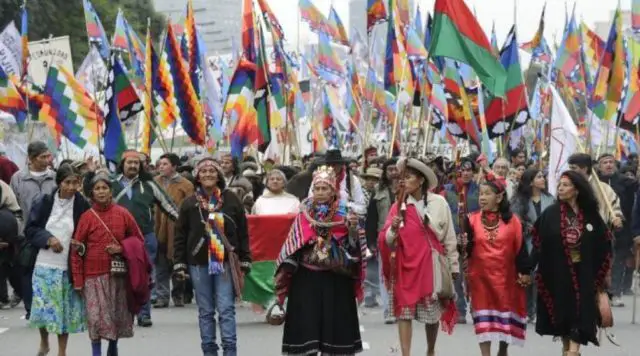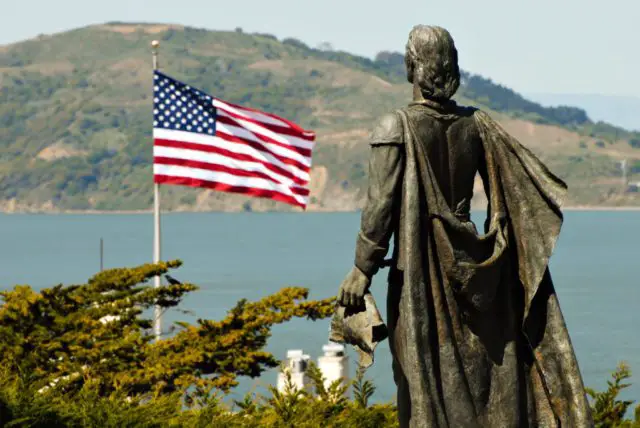Every October 12th we commemorate the arrival of the Genovese Admiral Christopher Columbus to America and celebrating also the meeting of different cultures. Recently to this date, it has been called as the “Day of the Meeting of Cultures”, while the European culture was found with the natives of the New World.
Before, October 12th was called the “Day of the Race” and, after a change in the national legislation, it was called the “Day of Cultures”, a change that was the result of a deep struggle of an important sector of the citizenship, conscious of the vital importance of memory in the construction and preservation of national identity.
Law N° 7426, of September 21st, 1994, abolished N° 4169, “Day of Discovery and Race”, July 29th, 1968, which was discriminatory and racist. The 1994 law established that “every year will be commemorated on October 12th as the ‘Day of Cultures’, to enhance the multi-cultural and multi-ethnic nature of Costa Rica“.

The existence of the American Continent was ignored (by Europeans) for a very long time. But an expedition undertaken by Christopher Columbus allowed his “discovery”, conquest and colonization by Europeans. The finding occurred on October 12th, 1492.
However, Columbus assumed that he had reached the shores of Asia, in India at that time. That is why the native inhabitants of this continent were called “Indians”. As the explorers entered their coasts, rivers, and lands, they understood that it was really a New World.
For years, every October 12th was celebrated the day Columbus discovered America because it was understood that this fact had contributed to the greatness and glory of Spain. In addition, 1492 is an important date for the Spanish people because that year they expelled the Arabs from their lands. That fact put an end to the yoke of Arab domination, whose presence in Spain lasted for 8 centuries.
The arrival of the Spaniards in the New World changed direction 502 years later. This happened in 1994, the date on which the Law of the Day of Cultures was promulgated. In this way, the traditional Day of the Race was obsolete and gave way to a new meaning. It is based on tolerance, recognizes the ethnic diversity prevailing in America and does not deny the inheritance of Spain, the legacy of the indigenous and the African contribution, among others.
Various cultures and ethnic groups
When the Day of Cultures was approved it became clear that the roots of Costa Rica, like those of the rest of the Latin American countries, come from 3 trunks that interact since 1492. They are Spanish, indigenous and African-Caribbean. It converted us -although some ignored it- into a multicultural and multiethnic nation. The establishment of this celebration also served to recognize that, since the middle of the previous century, our country has benefited from European, Central American, Asian, Hebrew, and Arab immigration, among others.
The meaning of this day
The Day of Hispanic Heritage commemorates the historic anniversary of the Discovery of America by Spain and the birth of the Spanish Empire. The celebration takes place every October 12th and, in it, each Spanish-speaking country celebrates it in a different way.
Different terms for the same day
In Spain, the official term at present is that of ‘National Holiday of Spain’. However, there are other terms used to designate this festivity: National Day of Spain, Fatherland’s Day, Fiesta of Hispanic Heritage, Day of the Race (in most Spanish-American countries), or Day of Indigenous Resistance (in Venezuela).
Columbus Day in the United States
Columbus Day is celebrated in the United States to honor Christopher Columbus, who is credited with discovering America on his 1st trip in 1492. It is celebrated on the 2nd Monday of October and in each State it is done in a different way.

This day stands out in the State of New York, with a great parade through the streets of the Big Apple; Government offices are closed, as well as public schools. In Denver, Colorado, there is also a parade each year which has been the subject of protest by Native American groups and their supporters for almost 2 decades.
For its part, the city of Berkeley, in California, has replaced Columbus Day for the “Day of the Indigenous People” since 1992.

